|
|
|
Sort Order |
|
|
|
Items / Page
|
|
|
|
|
|
|
| Srl | Item |
| 1 |
ID:
126511
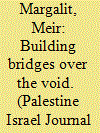

|
|
|
|
|
| Publication |
2012.
|
| Summary/Abstract |
After more than 45 years of occupation, the impact of nonviolent movements on Israeli society is still difficult to assess, and therefore their effectiveness is difficult to evaluate. The failure of all efforts aimed at ending the occupation is now clearer than ever, although, and this is remarkable, the fight against the system supporting this status quo has never declined. Despite this tireless activism, it remains unclear whether these nonviolent efforts have meaningfully contributed to peace or whether they have proved largely irrelevant to domestic and regional policies.
Not only do we lack convincing answers, but the answers we do have also differ depending on external circumstances. In bleak times, as during the Second Lebanon War, Operation Cast Lead and both intifadas, activist movements often feel useless. In contrast, during more encouraging times, such as the immediate aftermath of U.S. President Barack Obama's election, the feelings tend to be more positive and optimistic. This may be a defining issue among dissidents in Israel: shifting views without knowing what tomorrow has in store for them, going against the current within an uncertain environment.
|
|
|
|
|
|
|
|
|
|
|
|
|
|
|
|
| 2 |
ID:
082622


|
|
|
|
|
| Publication |
2008.
|
| Summary/Abstract |
Existing formal models of political behavior have followed the lead of the natural sciences and generally focused on methods that use continuous-variable mathematics. In 2002, Stephen Wolfram produced an extended critique of that approach in the natural sciences, and suggested that a great deal of natural behavior can be accounted for using rules that produce discrete patterns. This paper reports some initial findings designed to apply this pattern-based method to political event data. We believe that discrete sequence rule (DSR) models can provide a new social science methodology that is capable of preserving the agential basis of social interaction, tracking multiple agents as they enact rules through behavior directed at one another, and capturing the evolution of such interaction over time. The core of this project is a new, publicly accessible Web-based tool designed for the visualization and analysis of event data patterns Using event data on the Israel-Palestine conflict generated by the TABARI automated coding program of the Kansas Event Data System (KEDS) for the period 1979-2004, we perform an initial exploration of this methodology. Specifically, we identify patterned behavior for which specific rule use can be imputed, and then examine several agent-based rules, plus four "meta-rules," to parse Israeli-Palestinian interaction over time. Face validity of the analysis is apparent, and we also find the qualitative historical record can be augmented through observation of rule enactment in the event stream. Several descriptive empirical applications are demonstrated, including moving totals and increasingly complex sequences of rule enactment that go beyond the simple variations on tit-for-tat responses. While this paper represents an exploratory analysis of the method, the results are promising enough to warrant further investigation beyond its use in thick description as demonstrated here, to ultimately include hypothesis generation and falsification
|
|
|
|
|
|
|
|
|
|
|
|
|
|
|
|
| 3 |
ID:
020373
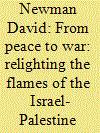

|
|
|
|
|
| Publication |
Autumn 2001.
|
| Description |
94-100
|
|
|
|
|
|
|
|
|
|
|
|
|
|
|
|
| 4 |
ID:
075256
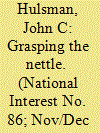

|
|
|
|
|
| Publication |
2006.
|
| Summary/Abstract |
As strange as it may seem, now is the best time to push for peace in the Middle East.
|
|
|
|
|
|
|
|
|
|
|
|
|
|
|
|
| 5 |
ID:
129197
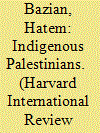

|
|
|
|
|
| Publication |
2014.
|
| Summary/Abstract |
On November 10th, 2013, the Israeli cabinet voted in a special session to authorize the demolition and removal of Umm al-Hiran, an "unauthorized," Palestinian Bedouin village in the Negev Desert, and to build in its place a new community for national Jews to be named Hiran, which had been planned and approved in early 2002. The stated reason for this demolition and forceful eviction is the lack of permits for the existing settlement, with Umm al-Hiran being one of a number of Palestinian Bedouin communities that were settled without permits and are currently subject to intense Israeli plans for removal. Umm al-Hiran itself was set-up in early 1956 by the Palestinian Abu-Alkian tribe after they had been forced to move from their ancestral tribal lands near Kibbutz Shoval in the Northern Negev.
A more critical development related to this event is the Israeli Parliament's passing of the first reading of the Prawer law. If the plan wins final approval, as it appears it will, it would cause the forceful displacement of 40,000-70,000 Arab Bedouins from the Negev, the confiscation of 800,000 dunams of Arab land, the razing to the ground of 36 or more Arab villages, and the dispossession of another generation of Palestinians. According to Adallah, the Legal Center for Arab Minority Rights in Israel, the "underlying premise of the draft bill is that there is no Bedouin land ownership," effectively negating the "population's right to property and historic affinity to the land." At the heart of this matter is the ongoing contestation of Palestinian land rights, with the Israeli government using its authority to define these policies to favor the Jewish population over the Arab. Thus, this bill, like others before it, "promotes the principle of segregation along the lines of ethnic affiliation and labeling."
|
|
|
|
|
|
|
|
|
|
|
|
|
|
|
|
| 6 |
ID:
111108


|
|
|
| 7 |
ID:
113259
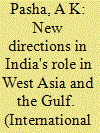

|
|
|
|
|
| Publication |
2010.
|
| Summary/Abstract |
Friendly and beneficial relations with the countries of West Asia, and the Gulf region in particular, have remained a key component of India's foreign policy on account of geopolitical, economic and strategic interests. The reasons for significance of this region for India now go beyond the assured supplies of energy resources. While non-alignment as a bonding has declined in bilateral relations with countries like Egypt after the end of the Cold War, the opportunities for trade and investments have gained salience in India's relations with the Gulf Cooperation Council (GCC) countries. The political uncertainty over the representative character of regimes in many countries of the region, the political fallout of the United States' policies and interests in respect of Iraq, Iran and the Palestine issue, along with India's new priorities in the form of stronger linkages with both the US and Israel could impinge on India's role in the region. It is in India's economic and strategic interest to maintain a positive relationship with all the West Asian countries by avoiding any undue influence from the US or Israel. It is also incumbent on India to stand by the people's voice for the introduction of genuine democratic political systems in these countries.
|
|
|
|
|
|
|
|
|
|
|
|
|
|
|
|
| 8 |
ID:
057692


|
|
|
| 9 |
ID:
108855


|
|
|
| 10 |
ID:
027161
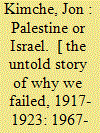

|
|
|
|
|
| Publication |
London, Secker and Warburg, 1973.
|
| Description |
xx, 360p.hbk
|
| Standard Number |
436233827
|
|
|
|
|
|
|
|
|
|
|
|
Copies: C:1/I:0,R:0,Q:0
Circulation
| Accession# | Call# | Current Location | Status | Policy | Location |
| 012827 | 956.94/KIM 012827 | Main | On Shelf | General | |
|
|
|
|
| 11 |
ID:
152594


|
|
|
|
|
| Summary/Abstract |
In the literature dealing with parliamentary diplomacy, the role that the European Parliament (EP) can play in the formation and conduct of European Union (EU) foreign policy is intensively studied. Yet analyses thus far have not dealt with how the EP can urge the EU and its member states to ensure foreign policy coherence. The essay aims to fill this gap. It draws on empirical data from the EP’s approach toward the Israel-Palestine conflict and aims to identify the ways the EP, although not directly and officially in charge of ensuring EU coherence, can contribute to promoting coherence in the EU’s foreign policy.
|
|
|
|
|
|
|
|
|
|
|
|
|
|
|
|
| 12 |
ID:
133137
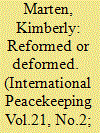

|
|
|
|
|
| Publication |
2014.
|
| Summary/Abstract |
A great deal of international attention and funding was given to reform and training of the Palestinian Authority Security Forces (PASF), starting with the Oslo Accords process in 1993 and accelerating with the advent of Fayyadism and the expulsion of the Palestinian Authority government from Gaza in 2007. Many donors and other supporters in the US, the EU, and Israel claimed this process as a success story, and indeed from 2008-2010 local conditions looked hopeful in the fragile, post-conflict West Bank proto-state. But soon unresolved political conflicts inside the West Bank encouraged patronage-based violence to reemerge within the security forces, and the fractured approach of the international community aggravated the situation. By 2013 reform had stalled. This article explores the history of patronage politics in the PASF and uses the Palestinian example to highlight the tensions inherent in contested visions of security, when international donors define success in terms of anti-terrorism rather than genuine domestic security governance.
|
|
|
|
|
|
|
|
|
|
|
|
|
|
|
|
| 13 |
ID:
116659
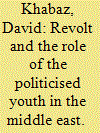

|
|
|
| 14 |
ID:
079540
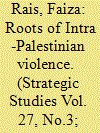

|
|
|
| 15 |
ID:
170504
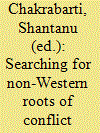

|
|
|
|
|
| Publication |
New Delhi, KW Publishers Pvt Ltd, 2013.
|
| Description |
xiv, 216p.hbk
|
| Standard Number |
9789381904718
|
|
|
|
|
|
|
|
|
|
|
|
Copies: C:1/I:0,R:0,Q:0
Circulation
| Accession# | Call# | Current Location | Status | Policy | Location |
| 059823 | 327.172/CHA 059823 | Main | On Shelf | General | |
|
|
|
|
| 16 |
ID:
133139
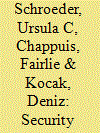

|
|
|
|
|
| Publication |
2014.
|
| Summary/Abstract |
Comprehensive Security Sector Reform (SSR) has become a crucial component of many international peace- and statebuilding operations. The paper assesses the consequences of these attempts to foster international standards of 'democratic security governance' in the security sectors of post-conflict or fragile states. The paper builds on qualitative case study research of SSR interventions in Timor-Leste, Liberia, and the Palestinian Territories, conducted 2010-2012, to trace patterns of adoption, adaptation or rejection of international security governance standards by domestic actors. The article uses insights from sociological organization theories to identify different types of 'hybrid security orders' that result from encounters between international and domestic models of security governance in SSR processes.
|
|
|
|
|
|
|
|
|
|
|
|
|
|
|
|
| 17 |
ID:
133532
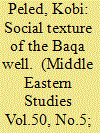

|
|
|
|
|
| Publication |
2014.
|
| Summary/Abstract |
Water sources have always played a significant role in Palestinian rural life. Springs and wells are frequently depicted in orientalist sources, yet they have barely been studied from the perspective of oral history. This article explores the social texture of an ancient well, located in the Palestinian Arab town of Baqa al-Gharbiyya in Israel, by using fragmented memories of the old women and men who drew water from that well more than half a century ago. This study examines the well as a powerful reservoir of local memories, focusing on the feminine experience that was formed at the well, on its symbolic meaning in the lives of Palestinian women, and on a silent language of implicit expressions that was once used at the well.
|
|
|
|
|
|
|
|
|
|
|
|
|
|
|
|
| 18 |
ID:
127676


|
|
|
|
|
| Publication |
2013.
|
| Summary/Abstract |
From (at least) the Balfour Declaration of 1917 right down to the present day, the Zionist-Palestinian conflict has been sculpted by external forces. But never entirely so: grassroots patterns of confrontation have also been vital. This article therefore adopts a "bottom-up" approach to the evolution of the conflict since the early twentieth century.
|
|
|
|
|
|
|
|
|
|
|
|
|
|
|
|
| 19 |
ID:
109934
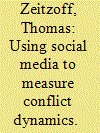

|
|
|
|
|
| Publication |
2011.
|
| Summary/Abstract |
The lack of temporal disaggregation in conflict data has so far presented a strong obstacle to analyzing the short-term dynamics of military conflict. Using a novel data set of hourly dyadic conflict intensity scores drawn from Twitter and other social media sources during the Gaza Conflict (2008-2009), the author attempts to fill a gap in existing studies. The author employs a vector autoregression (VAR) to measure changes in Israel's and Hamas's military response dynamics immediately following two important junctures in the conflict: the introduction of Israeli ground troops and the UN Security Council vote. The author finds that both Hamas's and Israel's response to provocations by the other side increase (both by about twofold) immediately after the ground invasion, but following the UN Security Council vote, Israel's response is cut in half, while Hamas's slightly increases. In addition, the author provides a template for researchers to harness social media to capture the micro-dynamics of conflict.
|
|
|
|
|
|
|
|
|
|
|
|
|
|
|
|
| 20 |
ID:
103822


|
|
|
|
|
| Publication |
Tel Aviv, Institute for National Security Studies, 2010.
|
| Description |
112p.
|
| Series |
Memorandum No. 106
|
| Standard Number |
9789657425213
|
|
|
|
|
|
|
|
|
|
|
|
Copies: C:1/I:0,R:0,Q:0
Circulation
| Accession# | Call# | Current Location | Status | Policy | Location |
| 055933 | 355.03305694/MEI 055933 | Main | On Shelf | General | |
|
|
|
|
|
|
|
|
|